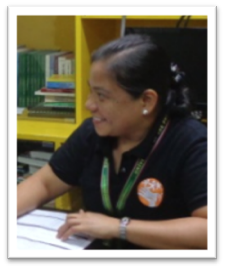Annaliza Macababbad
Social Worker, Philippine General Hospital, Philippines
 Overview
Overview
Annaliza is a social worker at the Philippine General Hospital Child Protection Unit in Manila. Annaliza manages child abuse cases in collaboration with an interdisciplinary team. The team’s work starts when suspected child abuse is reported to the local social welfare and development office. They continue with referrals for further intervention—sometimes numerous, depending on the needs of the child and family. Team members engage in ongoing coordination and evaluation until the child is prepared for family and community reintegration. All the minutiae involved in these steps can spell the difference between success and failure for the child.
Typical tasks and responsibilities Annaliza and her team:
- Assess potential and ongoing child abuse
- Help identify and select appropriate placement options for abused children
- Evaluate risks to determine the possibility of further abuse
- Actively coordinate with agencies providing services to abused children and their families
- Discuss and resolve critical concerns in case management
- Convene and facilitate case conferences
Other aspects of Annaliza’s job include doing group work with children; offering parenting classes, family meetings, and family therapy; and providing individual therapy referrals. All of these can bring about better outcomes. Sometimes Annaliza conducts home visits, which can be challenging when families live in hard-to-find slum areas.
Annaliza and other social workers also facilitate the “Kids in Court” program. When children testify at “Kids in Court,” they learn about their rights, receive support during their testimony if needed, understand that it is normal to feel nervous and anxious while testifying, and receive reassurance that no one can hurt them in court. They receive certificates of bravery after the court session for their willingness to testify.
Training and skills
Annaliza has attended many skills enhancement seminars, workshops, and trainings, but most importantly she has completed a Certificate in Child Protection Specialty Training for Social Workers through Philippine General Hospital, University of the Philippines Manila, Child Protection Unit. Such learning opportunities are a “plus,” contributing to Annaliza’s successful management of cases. Annaliza also works with a great team that not only manages child abuse cases but also trains other professionals—including doctors, police officers, and social workers—in a nationwide attempt to standardize case management protocols.
Story
Maria, 13 years old, was brought in for evaluation after disclosing to her teacher that her father had been sexually abusing her since age 9. Maria had reported the abuse to her mother, who did not believe her. The case management team decided to place Maria in protective custody because no relatives were available. Maria was very upset with the decision, because she did not want to be taken away from her younger sibling, who was also possibly being molested by their father. Annaliza comments, “Taking children for protective custody has always been a challenge for me, especially when a child starts to cry because of the impending separation from her family. In my experience, no matter what, children want to stay with their families most of the time. When this conflicts with their safety, case management becomes very challenging.”
After Maria moved to the shelter, Annaliza conducted a home visit to identify supportive adults and also worked with Maria’s teachers so that Maria’s studies would not be disrupted. Because Maria was hesitant to file a complaint against her father, Annaliza’s team convinced the local social welfare office to assist her in filing charges. Maria remained in the shelter and worked with the “Kids in Court” program to prepare her testimony.
Why she loves her job
Handling child abuse cases such as Maria’s entails skills, training, and the less quantifiable but supremely important qualities of patience and understanding. For Annaliza, her work is more than just a job. She states, “It is my passion to help vulnerable children and their families, and I will continue to be a social worker because I consider even just helping one or two children become successful in their lives as a great achievement and a[s] priceless [a] trophy [as] one can ever get.” Annaliza finds it rewarding when children become empowered and choose to develop their talents to the fullest even after going through a devastating life event. Although she notes the “heartbreak” when cases do not turn out successfully—sometimes simply because of resource limitations—she gives credit to the vital role that caregivers and supportive adults play in the recovery process.
